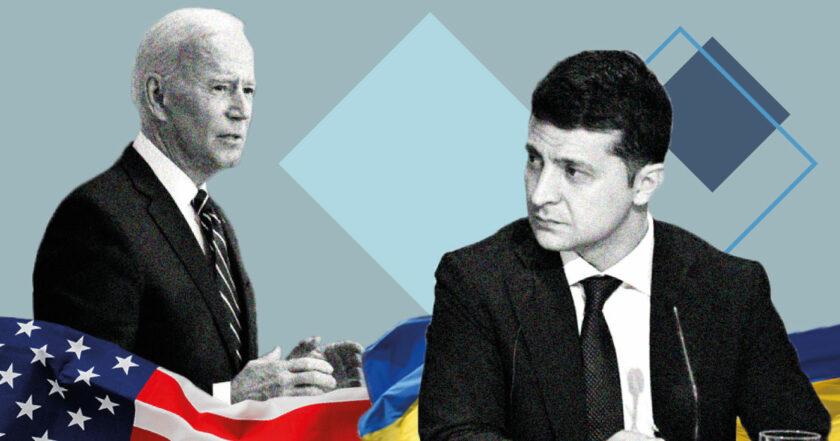U.S.-Ukrainian relationship: the view from Ukraine

Photo: Rubryka
On September 1, 2021, Presidents Joseph Biden and Volodymyr Zelensky met. On the one hand, the Ukrainian politicians had great hopes for this meeting, and on the other were ready for its possible unsuccessfulness. The meeting intense anticipation formed in the politicians' and the expert' minds three possible algorithms for the further interstate relations development: formal or informal progress; stagnation or maintaining the status quo; regression of U.S.-Ukrainian relationships. In addition, nervousness among the Ukrainian establishment (regardless of political orientation) has been exacerbated by recent events related to United States and Russia negotiations, Nord Stream 2, Afghanistan, etc. Significant attention to the results of this meeting were paid by Russia officials, indirectly – representatives of some EU states.
Negotiations at the highest level mayn't have been the starting point for a qualitative renewal of bilateral relations, but it is hardly possible to call them useless. Based on general assessments of the visit results, most Ukrainian experts and media got the impression of a new round of "old-new" acquaintance in order to develop new mechanisms for further coexistence. And the visit itself is perceived as a "review" of the current Ukrainian authorities for their compliance (from the US point of view) with the criteria of professional suitability, controllability and readiness to become a partner/wingman/satellite in the unstable geopolitical environment. Cause there are many global challenges and threats facing the United States, Ukraine and the world community in general.
Among the main achievements of the President V. Zelensky's three-day visit is the confirmation of the U.S. support of Ukraine in the following issues: restoration of Ukraine territorial integrity; Euro-Atlantic aspirations of the Ukraine; providing security assistance to Kyiv and cooperation in the defense sector (including the provision of a new $ 60 million aid package, including Javelin systems and other defense lethal and non-lethal equipment); providing Ukraine with $ 45 million in humanitarian aid and almost $ 500 million for reforms; agreements with NASA on cooperation in space, etc.
Of course, the reached agreements are not limited to the above mentioned. After all, traditionally, in addition to the public component, there is also a private, non-public part of the negotiations, which is often more important in its content. Traditionally, Ukrainians place even greater hope on it than on the public aspect. We shouldn't forget about the personal component in the communication of the two leaders and its impact on the bilateral relations prospects. At this point, the Ukrainian media, regardless of political and business orientation, had paid special attention
Many different assessments of this visit effectiveness were offered in both the Ukrainian and American expert community and the media. However, in our opinion, it would be interesting to consider the V. Zelensky's visit from a slightly different point of view: the visit as a marker of bilateral relations between the U.S. and Ukraine. After all, in order to move forward, it is necessary to know what "assets" are available in the interstate relations portfolio.
Systematizing the expert assessments, citizens' attitudes and the Ukrainian establishment interests, the following positions on the U.S.-Ukrainian relations' issue can be suggested:
- the "patchwork" or the fragmentation of U.S.-Ukrainian policy. Lack of an updated United States strategy for Ukraine, especially in the second decade of the 21st century. The fragmentation of U.S. foreign policy towards Ukraine is due to the dominance of various pressure groups in the middle of the United States, which naturally pursue their own corporate and domestic political interests;
- the variability of the U.S. establishment vision on the future of political project "Ukraine" and the mechanisms of its implementation. There are different approaches to interpreting U.S. national interests in Ukraine among the American elite (through the aspects of: personal connections, business prospects, resources costs and opportunities). And this is despite the unanimity Ukraine's support by the American political class and intellectuals. For some, Ukraine's future is crystallized through the prism of American values in the broadest sense of the word, for others through the prism of Euro-Atlantic interests, for others through the United States' relations with the Russian Federation and the People's Republic of China. Such "hybrid partnership policy" leads to a free interpretation by domestic pressure groups of Ukraine's role on the "Grand chessboard" of the United States: Partner? Ally? Companion? Satellite? Resource base? Geopolitical/Regional/Technological project? etc;
- deep interpenetration of the U.S. and Ukrainian "agenda" in their domestic policy. The "American card" has become an element of Ukraine's domestic policy, which is actively used by the U.S.-oriented part of the Ukrainian establishment, civic activists, lobbyists etc. Instead, supporters of the "eastern course" of the state's development use this thesis as the part of the on Ukraine's "external governance" discourse. Paradoxically, over the past period of time, the "Ukrainian card" has become part of the US domestic political discourse too. As a result, the foreign policy of both states in many respects is a continuation of their own internal processes;
- loss of "individuality" in interstate cooperation. Ukraine, maintaining the Euro-Atlantic course with the key U.S. partnership, according to a significant part of the citizens, in many projects loses its subjectivity, partnership individuality and development potential in other areas of social development. This, in turn, in our opinion, is a loss for the United States, as a global provider of values on the political map of the world. There is no doubt about the U.S. leading role in the public administration system reforming in Ukraine. However, behind the "forest" of general principles, wishes and slogans the individual features of the partnership are blurred, which under other conditions, on the contrary, could strengthen Ukraine on the path of its democratic transit. Successful experiences could be borrowed by the U.S. to strengthen its own competitiveness and create a new "efficiency cluster" in relations with partners. Especially considering that the most difficult stages of the path have already been overcome by the Ukrainian and American peoples.
- the myth desacralization of the extraordinary role of the U.S. in the eyes of the Ukrainian middle class. Despite the understanding of the extraordinary value of U.S. support by the overwhelming of Ukrainians (against the background of Russian aggression and exhausting war, social crisis, endless reform of state and social institutions and the pandemic) the attractiveness of the United States as Ukraine's "ideal partner" is being lost. The civic activists, political class members and some government officials affiliated with the U.S. are becoming, for various reasons, "toxic" to existing political projects and reforms.
Of course, the above list of characteristics of U.S.-Ukrainian relationship is inexhaustible, however, it provides an opportunity to understand the main trends in relations between these two states (from the standpoint of Ukraine). Their understanding and consideration in the political-managerial decision making will allow to effectively build interstate relations not only on the horizontal relations of "U.S.A-Ukraine", but also at the level of the Euro-Atlantic community as a whole. After all, Ukraine can serve as a unifying factor of Euro-Atlantic cooperation and become a symbol of successful interstate collaboration in the XXI century.
Sergii Teleshun, DSc (Poli. Sci.), Professor
Iaroslav Teleshun, Ph.D. (Poli. Sci.), Associate Professor




















































